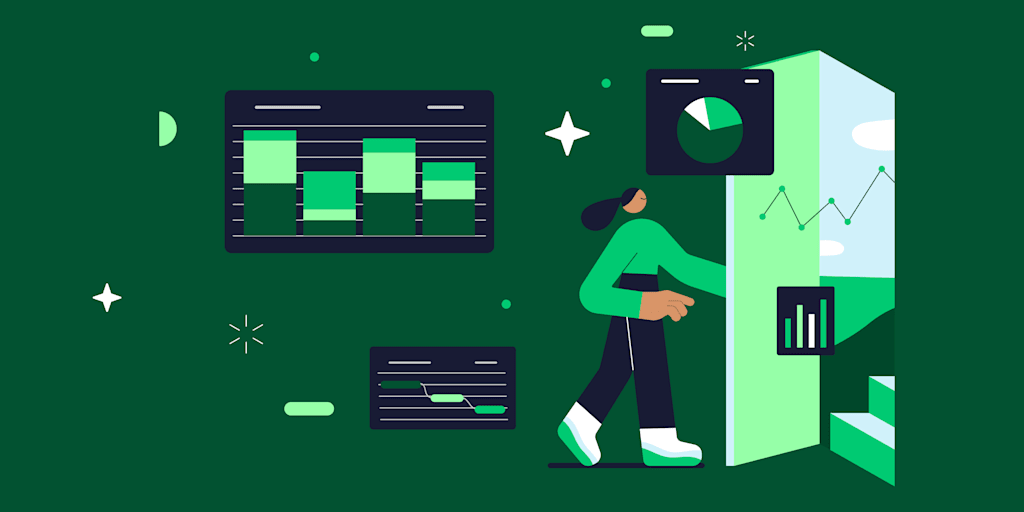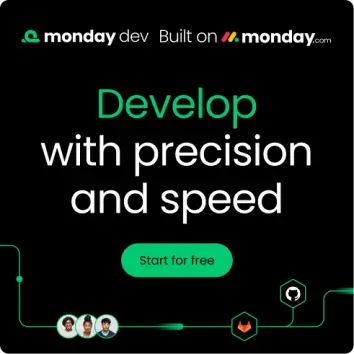Software teams are under constant pressure to ship more features faster without compromising on quality. That balancing act often stretches resources thin and pulls attention away from strategic, long-term work. AI in software engineering offers a way to ease that tension, shifting teams from reactive problem-solving to proactive building.
This guide breaks down the real-world applications of AI across the development lifecycle. We’ll look at how it speeds up code generation, strengthens quality assurance, and streamlines documentation. You’ll also find strategies for putting AI into practice, from spotting quick wins to tracking ROI, so your team can unlock value right away.
Ultimately, adopting AI is not just about adding new tools. It is about building a stronger foundation that aligns your people, your processes, and your goals. By understanding how AI is reshaping development, you can create a more confident, efficient, and future-ready engineering organization.
Try monday devKey takeaways
- Start small: Begin with AI wins like automated code formatting and test generation to build confidence before moving on to more complex use cases.
- Automate routine tasks: Free your team to focus on creative problem-solving and strategic decisions that deliver real value.
- Measure impact: Track deployment frequency, bug escape rates, and developer satisfaction to understand how AI improves productivity and code quality.
- Use monday dev’s foundation: Implement AI your way with built-in capabilities for code analysis, workflow automation, and predictive planning that keep development and business teams aligned.
- Balance automation with expertise: Automate the repetitive work, but keep humans at the heart of innovation and strategy.
What is AI software engineering?
AI for software engineering is the use of machine learning, natural language processing, and automated decision-making systems throughout the development process. This means your team can automate repetitive coding tasks, predict potential bugs before they happen, and generate documentation automatically — all while maintaining code quality.
The shift from manual to AI-assisted development changes everything about how teams work. According to a 2025 AI Index Report by the Stanford Institute for Human-Centered AI’s, 78% of organizations used AI in 2024 — a significant jump from 55% the previous year.
How AI accelerates code generation and development speed
Code generation through AI means developers type less and deliver more, with some organizations reporting up to 30–50% faster code generation after adopting AI platforms, according to McKinsey. AI-driven software engineering analyzes your existing codebase, understands your project patterns, and suggests complete code blocks that match your style.
It works like having a coding partner who already knows your entire project history. As you begin writing a function, AI predicts what you need and offers tested, production-ready code that integrates seamlessly into your work. With monday dev, teams get this advantage directly within their workflow. The platform’s AI assistant not only analyzes codebase patterns but also suggests optimized solutions that align with your team’s practices, keeping quality high while speeding up delivery..
Enhancing testing and quality assurance with AI
Automated testing with AI in software engineering goes beyond running pre-written test scripts. AI creates new tests based on your code changes, predicts where bugs might hide, and updates tests automatically when your code evolves.
This proactive approach helps teams catch issues earlier in the development cycle. With monday dev, AI-powered quality assurance enhances the process by:
- Flagging potential issues directly in workflows so developers see them where work happens.
- Suggesting smarter test coverage tailored to your team’s coding patterns.
- Centralizing test results to give product managers, QA, and engineers shared visibility.
- Supporting faster, more confident releases by aligning quality checks with every stage of development.
Automating documentation and knowledge management
AI software engineering documentation means your code comments and technical guides practically write themselves. As you code, AI generates clear, accurate documentation that updates automatically with every change.
This keeps your knowledge base complete and up to date, so the whole team works from the same source of truth. With monday dev, AI documentation is built directly into your workflows — automatically generating and updating technical docs as your code evolves, while keeping everything organized alongside tasks, commits, and project context. That way, engineers, product managers, and stakeholders always have the latest information at their fingertips.
Optimizing project planning and resource allocation
Predictive analytics for AI software engineering means understanding project timelines before you start coding. AI analyzes your team’s past performance, current capacity, and project complexity to create realistic schedules.
Resource optimization in AI software engineering further ensures the right developers work on the right features at the right time. monday dev helps teams visualize these AI-driven insights, making complex resource decisions simple and transparent. Its predictive planning tools analyze historical data to forecast project timelines and automatically suggest optimal resource allocation based on team strengths and project requirements.
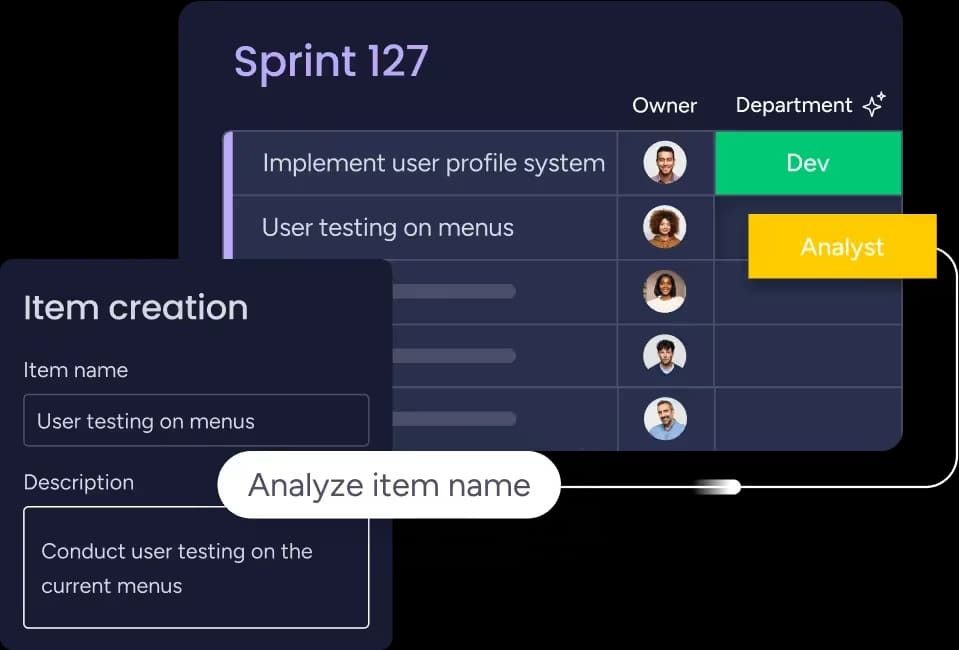
7 essential AI applications for software engineering success
AI is no longer a “nice to have” — it’s becoming an essential part of modern software development. From speeding up coding to improving quality and keeping documentation current, AI tools for developers can ease the pressure on engineering teams and unlock new levels of efficiency.
In this section, we’ll explore seven practical AI applications that deliver measurable value across the entire development lifecycle. Each one highlights how teams can work smarter, move faster, and maintain higher quality.
1. Intelligent requirements analysis and specification
Requirements analysis with AI helps teams turn vague stakeholder requests into actionable development specs. Instead of manually sifting through scattered inputs, AI processes emails, meeting notes, and feedback forms to surface what users actually need.
With AI, teams gain:
- Clear user stories: Generated directly from natural language input.
- Acceptance criteria: Automatically outlined to remove ambiguity.
- Priority rankings: Helping teams focus on the most impactful work.
- Technical specifications: Created from stakeholder context for smoother handoffs.
monday dev’s AI requirements assistant brings all of this into your workflow by analyzing stakeholder communications and automatically generating structured user stories with defined acceptance criteria. This keeps everyone aligned from the very start of the project.
2. AI-powered design and architecture planning
Strong architecture decisions shape the success of any project. AI can analyze requirements, evaluate multiple architectural patterns, and recommend designs that fit both your team’s skills and long-term goals.
With AI-driven planning, teams benefit from:
- Recommendations based on proven patterns that reduce risk.
- Scalability predictions to ensure systems grow with demand.
- Compatibility checks against your existing infrastructure.
- Visualized dependencies that clarify how components interact.
Architecture planning in monday dev builds on these capabilities by using AI to surface the best-fit designs and highlight trade-offs, giving teams the clarity to make informed decisions faster.
3. Automated code generation and refactoring
AI refactoring for software engineering means improving code structure without changing what it does. AI identifies messy code, suggests improvements, and can even implement changes automatically.
With this approach, your codebase stays clean, performant, and maintainable without the manual review overhead. To help streamline the process, monday dev integrates with leading code generation tools and provides AI-powered code quality metrics to track improvements over time.
4. Smart testing and bug detection
AI testing in software engineering adapts to your code. It knows which changes are risky, which features users rely on most, and where bugs typically appear in your system.
Smart detection in AI software engineering means catching security vulnerabilities and performance issues before they reach production. monday dev’s AI testing capabilities can predict high-risk code areas and automatically prioritize testing resources where they’ll have the greatest impact.
5. Streamlined deployment and CI/CD pipelines
CI/CD in AI software engineering essentially related to deployments that fix themselves. AI monitors your pipeline, predicts failures before they happen, and automatically rolls back problematic releases.
With this approach deployments become faster, safer, and require less manual oversight. CI/CD integrations in monday dev can further help leverage AI to optimize deployment schedules and automatically detect potential deployment issues before they impact users.
6. Predictive maintenance and performance monitoring
Predictive maintenance in AI software engineering helps teams catch issues before users are affected. By continuously monitoring application metrics, AI detects unusual patterns, flags potential risks, and alerts teams to failures before they occur.
This shifts performance management from reactive firefighting to proactive optimization. With integrated monitoring tools, monday dev uses AI to analyze performance trends, surface early warning signals, and automatically notify teams of issues — helping prevent downtime and keeping user experiences seamless.
7. Real-time documentation and code review
AI code review in software engineering provides instant feedback on pull requests. It checks for security issues, suggests improvements, and ensures your team’s coding standards are met.
Documentation updates happen automatically, keeping your API docs and user guides in sync with your latest code. AI documentation features within monday dev can support by generating comprehensive documentation from your codebase: keeping it updated as your project evolves.
Try monday dev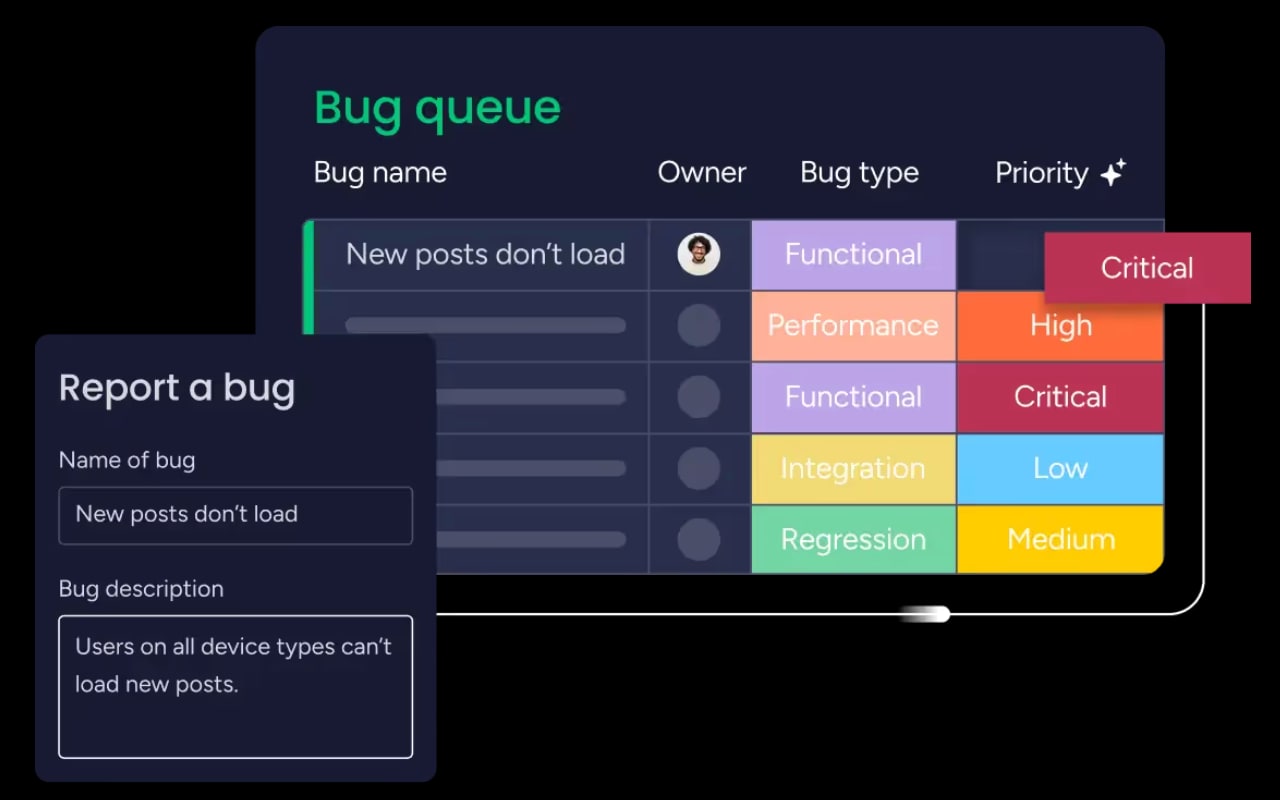
5 proven strategies to implement AI in software development
Want to bring AI into your development process? These strategies help you start small and focus on scaling AI software engineering successfully.
1. Identify high-impact use cases for quick wins
Start with the tasks that eat up your team’s time but don’t require creativity. Look for repetitive work that follows clear patterns — these are perfect for AI automation.
Consider these high-impact starting points:
- Manual code formatting: Let AI handle style consistency while developers focus on logic.
- Basic test creation: Automate unit test generation for standard functions.
- Bug categorization: Use AI to sort and prioritize incoming bug reports.
monday dev’s AI assistant can immediately help with these tasks, providing automated code formatting suggestions and intelligent bug categorization right out of the box.
2. Create a phased AI adoption roadmap
Phased adoption means starting simple and building confidence. Begin with individual productivity tools, then expand to team-wide solutions.
Your roadmap might span six to twelve months, with each phase building on previous successes. Early wins create momentum for bigger changes. monday dev’s AI implementation templates provide ready-made roadmaps you can customize for your team’s specific needs.
3. Integrate AI platforms with existing development workflows
AI should complement your current process, not replace it. Look for platforms that connect seamlessly with the tools you already use — your IDE, version control system, and project management software.
A strong fit in this area, monday dev brings AI software engineering insights directly into existing workflows without requiring teams to abandon familiar tools. With native integrations to GitHub, GitLab, Jira, and other development platforms, it ensures AI capabilities enhance productivity while keeping processes consistent.
4. Establish governance and quality standards
AI governance means setting rules for how your team uses AI assistance. Define when AI suggestions need human review, how to handle AI-generated code, and what quality standards apply.
Clear guidelines can really help to prevent over-reliance on AI while maximizing its benefits. For support in this area, governance features in monday dev let you set approval workflows and quality gates for AI-generated content, ensuring consistent standards across your team.
5. Build continuous learning and improvement cycles
Track the impact of AI on your team’s productivity by gathering feedback, measuring results, and adjusting based on what delivers the most value.
Regular reviews help ensure your AI software engineering strategy evolves alongside your team’s needs. With AI analytics dashboards built into monday dev, you get real-time insights into usage patterns and impact metrics, making it easier to refine your approach and maximize results over time.
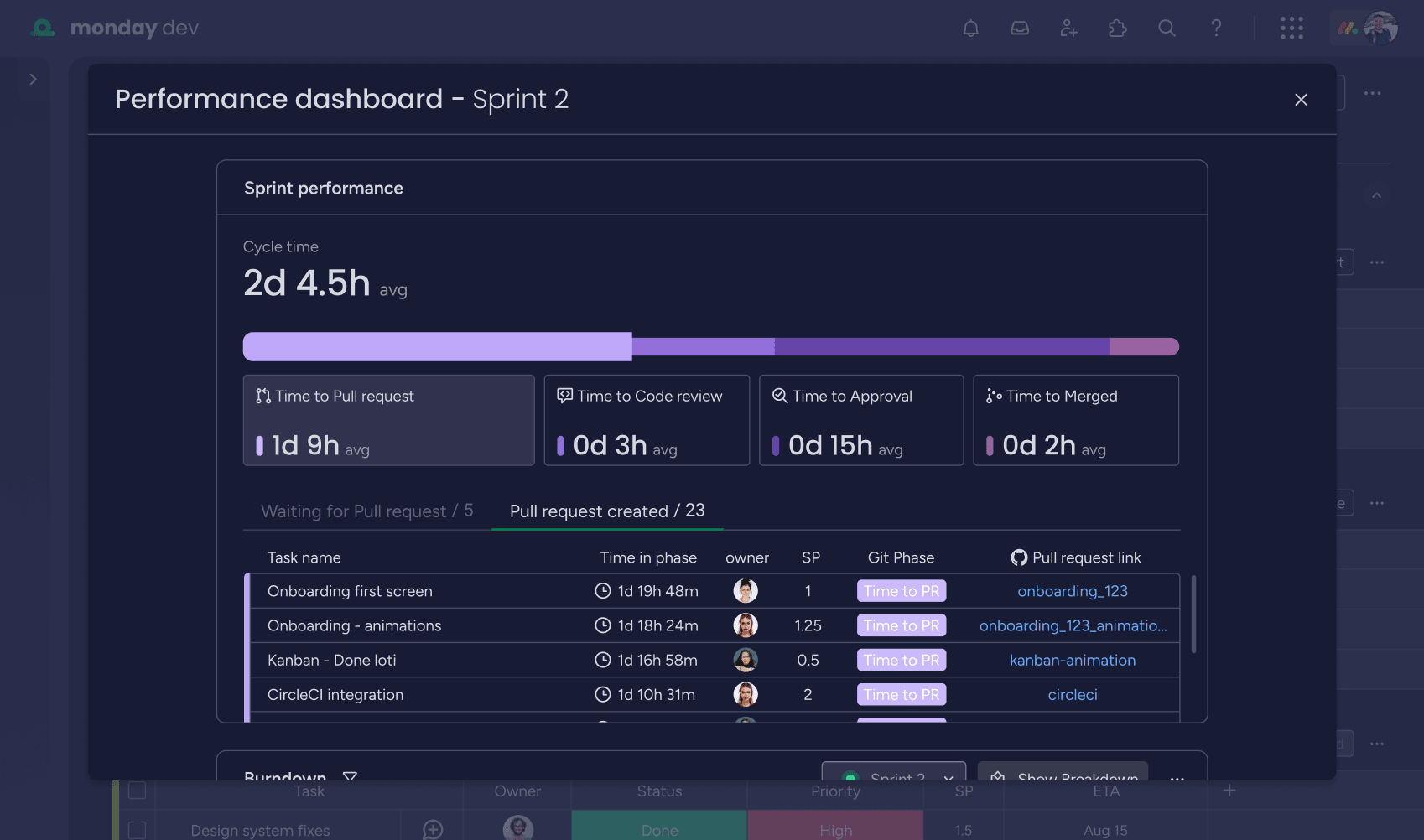
How to build your AI-enhanced development environment
An AI-powered workspace takes more than adding new tools. It requires the right mix of platforms, practical training, and thoughtful workflow design so AI strengthens your team’s work instead of disrupting it. This section outlines how to choose the right foundation, prepare your people, and shape processes that let AI deliver lasting value.
Selecting the right AI software development platforms
Platform selection starts with understanding your team’s specific needs. Look for solutions that integrate smoothly, scale with your growth, and maintain your team’s autonomy.
Key features to evaluate include:
| Feature category | What to look for | Why it matters |
|---|---|---|
| Integration capabilities | Works with your current tech stack | Reduces adoption friction |
| Customization options | Adapts to your coding standards | Preserves team culture |
| Scalability | Handles growing team and project complexity | Supports long-term success |
Training your team for AI-powered development
Effective training focuses on practical skills, not theory. Developers should see firsthand how AI enhances their work rather than replaces it. Addressing concerns directly is key — AI augments human creativity, it does not replace it.
The best approach combines hands-on practice with clear guidelines, a crucial step given that 60% of employees believe more effective training would improve change management, according to monday’s World of Work report. To support this, monday dev offers built-in training resources and guided onboarding for AI features, helping teams adopt AI with confidence.
Designing workflows that maximize AI benefits
Effective workflows balance automation with human judgment. The goal is to let AI handle the repetitive work while keeping humans in control of innovation and strategic decisions.
With the right design, teams can:
- Automate routine decisions to free up time for higher-value tasks.
- Preserve human oversight on complex or strategic choices.
- Streamline processes so work flows naturally across tools and teams.
- Adapt workflows over time as AI learns from patterns in your projects.
The AI workflow designer in monday dev makes this possible by automatically routing work, suggesting next actions, and evolving with your team’s unique development practices — so efficiency grows without sacrificing control.
Try monday devMeasuring success with AI software engineering platforms
Adopting AI is only the first step — the real question is whether it’s delivering measurable value to your team and business. Success is about more than speed. It’s about improving quality, boosting developer satisfaction, and driving outcomes that matter at scale.
In this section, we’ll cover how to track the right performance metrics, calculate ROI, and apply best practices that keep AI adoption sustainable. With the right measurement in place, you can prove impact, refine your approach, and ensure AI becomes a lasting driver of engineering success.
Key metrics for AI development performance
Focus on outcomes that demonstrate real value. Speed matters, but so does quality and developer satisfaction.
Essential metrics to track include:
- Deployment frequency: How often you ship new features.
- Bug escape rate: Issues that reach production.
- Developer satisfaction: Time spent on meaningful work versus routine tasks.
With monday dev’s AI analytics dashboard, teams can also automatically tracks these metrics and visualizes trends over time, giving immediate visibility into your AI implementation’s impact.
Tracking productivity gains and time savings
Measuring success goes beyond speed alone. Track both direct time savings — such as how much faster developers complete tasks — and indirect benefits like improved code quality and stronger team morale.
Establishing baseline metrics before introducing AI makes progress easy to see. With time tracking integrated into AI usage, monday dev highlights exactly how much time your team saves through AI-assisted workflows and how those gains translate into lasting productivity improvements.
Calculating ROI from AI implementation
ROI includes cost savings and value creation. Factor in reduced development time, fewer production bugs, and faster feature delivery.
Consider long-term benefits like improved developer retention and competitive advantage. monday dev’s ROI calculator can help you identify your actual usage data, enabling you quantify the business impact of your AI implementation across multiple dimensions.
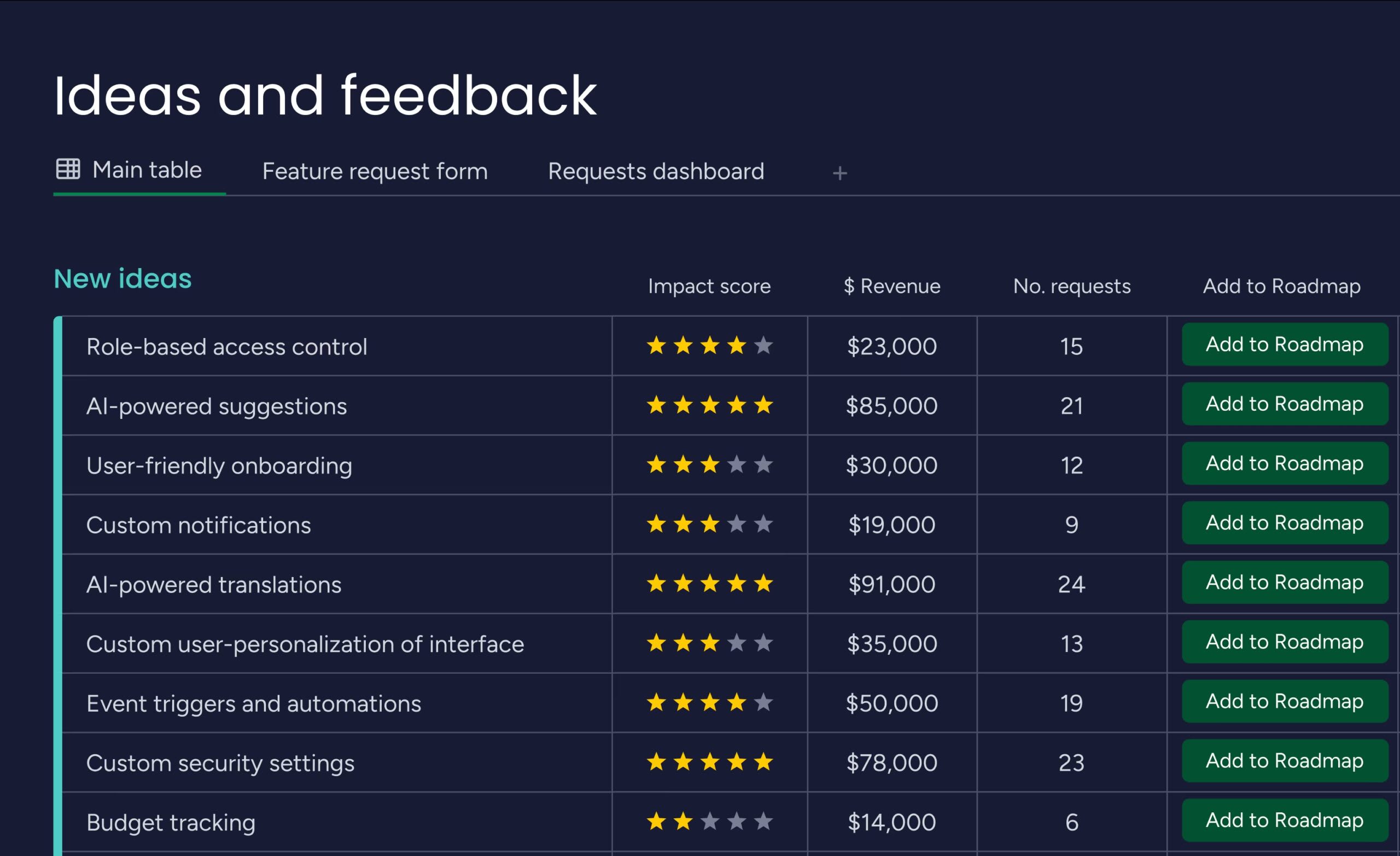
Best practices for AI and software engineering integration
Bringing AI into software engineering is not just about choosing the right tools. Lasting success comes from thoughtful implementation and continuous refinement. Teams that plan carefully, manage change effectively, and balance automation with human expertise are better positioned to unlock the full value of AI.
Managing change across development teams
Change management starts with clear communication, especially when there is often a gap between leadership and employees. According to the monday Work Report, 45% of senior leaders believe change is managed “very well,” yet only 23% of individual contributors feel the same. AI adoption makes this gap even more visible, which is why transparency and support are critical.
Key practices for managing change include:
- Explain the why: Share why you are adopting AI, what benefits to expect, and how it will affect daily work.
- Provide ongoing support: Help teams adjust as workflows evolve with AI.
- Celebrate early wins: Highlight quick successes to build trust and momentum.
- Leverage built-in resources: AI adoption templates in monday dev include communication plans, training materials, and success metrics to guide the process.
Maintaining code quality with AI assistance
Treat AI-generated code like any other code — review it, test it, and ensure it meets your standards. AI suggestions need the same scrutiny as human contributions.
Regular audits ensure AI enhances rather than compromises your code quality. monday dev’s AI quality gates automatically flag AI-generated code for review and track quality metrics over time to ensure standards remain high.
Balancing automation with human expertise
The best AI implementations preserve human creativity. Automate the routine, but keep humans in charge of innovation and strategic decisions.
Define clear boundaries between AI assistance and human judgment. monday dev’s AI governance features let you configure exactly where AI can act autonomously and where human review is required, maintaining the perfect balance for your team.
The future of AI software for developers and teams
AI is moving fast, and its role in software development is expanding just as quickly. What started with code suggestions and automated testing is now evolving into end-to-end support across the entire development lifecycle. For engineering teams, this means new opportunities to move faster, reduce errors, and focus more energy on creative problem-solving.
Below, we explore three areas that will shape the future:
Emerging AI capabilities reshaping development
New AI technologies promise even more sophisticated assistance. Expect improved natural language understanding, better code generation, and more accurate project predictions.
Future developments will also likely focus on deeper workflow integration and more nuanced development support. monday dev’s AI roadmap includes these emerging capabilities, with regular updates that bring the latest AI advancements directly into your workflow.
Essential skills for tomorrow’s software engineers
Tomorrow’s developers need AI collaboration skills. This means understanding prompt engineering, evaluating AI suggestions, and knowing when human judgment trumps AI recommendations.
Technical skills remain important, but working effectively with AI becomes equally valuable. monday dev’s AI skill development modules help your team build these critical capabilities through guided learning paths and hands-on exercises.
Preparing your organization for continuous AI evolution
Build flexibility into your processes. Create learning cultures that embrace new AI capabilities as they emerge.
It’s also essential to invest in continuous education and maintain adaptable technology architectures that can incorporate new AI advances. monday dev’s flexible platform evolves with AI technology, ensuring your team always has access to cutting-edge capabilities without disruptive platform changes.
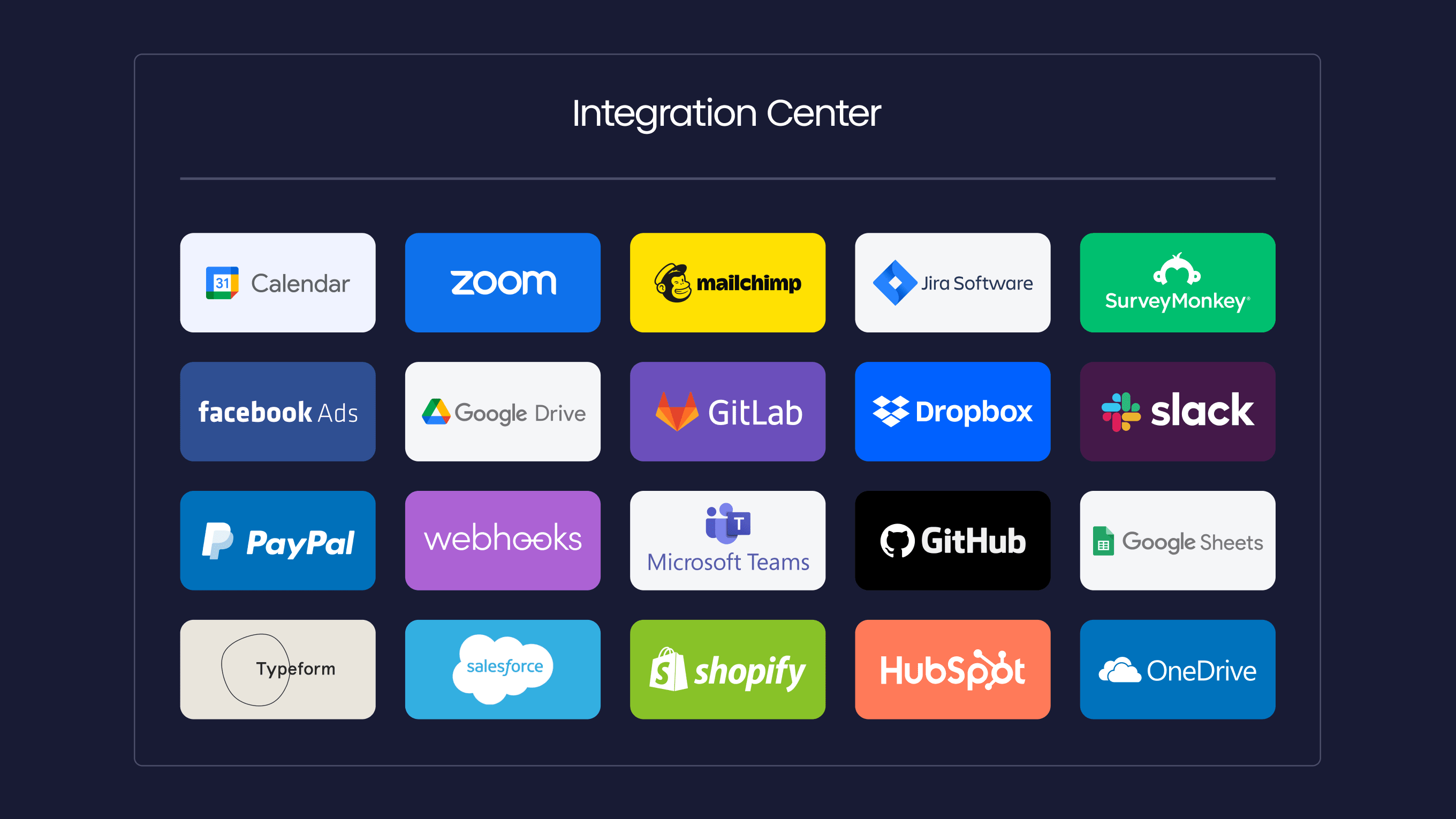
Accelerate AI implementation with monday dev
Adopting AI in software engineering is not just about adding new tools. To see real impact, teams need a foundation that supports experimentation, adapts to changing workflows, and keeps everyone aligned on results. monday dev provides that foundation. Built on the monday.com Work OS, it gives engineering teams the flexibility to implement AI their way — from quick wins like code generation to advanced predictive systems — while maintaining full visibility across projects through powerful integrations and customizable workflows.
Unified visibility for AI-enhanced projects
AI implementation often creates complex workflows with shifting requirements. monday dev simplifies this complexity with AI dashboards that deliver real-time insights into your adoption journey. From one workspace, you can:
- Track key metrics such as code generation speed, AI-assisted test coverage, and deployment frequency.
- Build custom dashboards with specialized AI widgets that surface exactly what matters to your team.
- Visualize impact across the lifecycle — from initial requirements through to production deployment.
- Identify ROI by seeing which AI tools deliver the most value within your workflows.
Flexible workflows that adapt to AI platforms
Every development process is unique, and monday dev is built to adapt to the way your team works. With just a few clicks, you can:
- Integrate your preferred AI tools such as GitHub Copilot, Amazon CodeWhisperer, testing platforms, or documentation generators directly into your boards.
- Design workflows that reflect your practices instead of forcing rigid, one-size-fits-all structures.
- Experiment with different AI applications and adjust as your needs evolve throughout 2025.
- Automate routine steps by routing AI-generated code for review, triggering tests when AI suggests changes, or updating documentation when new features are deployed.
Seamless integration between development and business teams
AI adoption affects both technical and business stakeholders. monday dev connects the two by creating cross-functional visibility. With role-specific views, you can:
- Give engineers technical details they need to refine workflows.
- Provide managers productivity insights on delivery speed and quality.
- Show executives ROI metrics that link AI adoption to business outcomes.
To keep everyone aligned, monday dev also:
- Shares AI implementation metrics automatically through customizable notifications.
- Delivers scheduled reports tailored to each stakeholder group.
- Provides executive dashboards for high-level visibility without extra reporting overhead.
Frequently asked questions
How much does implementing AI in software development cost?
AI implementation costs vary from free basic coding assistants to enterprise solutions costing hundreds per developer monthly. Total investment includes platform fees, training time, and integration work, but most teams see positive returns within three to six months through improved productivity.
What programming languages work best with AI development platforms?
Python, JavaScript, Java, and C# typically have the strongest AI platform support due to widespread use and extensive training data. However, most modern AI platforms support multiple languages effectively.
Can AI platforms integrate with existing development environments?
Yes, AI platforms connect with most development environments through APIs, IDE plugins, and direct integrations with version control and CI/CD systems. Modern platforms prioritize compatibility to minimize disruption.
What security measures should teams implement for AI-generated code?
Teams should review AI-generated code as rigorously as human-written code, implement automated security scanning, and establish clear guidelines for using AI with security-sensitive components. Never deploy AI suggestions without proper testing.
When do development teams typically see ROI from AI platforms?
Most teams see measurable ROI within 3-6 months, with initial productivity gains appearing in weeks. Faster returns come from larger teams, complex workflows, and well-chosen initial AI applications.
Which AI coding assistants increase development speed most effectively?
AI coding assistants that integrate directly with your IDE and understand your codebase context deliver the best speed improvements. The most effective assistants offer intelligent code completion, natural language to code conversion, and automated refactoring suggestions.
